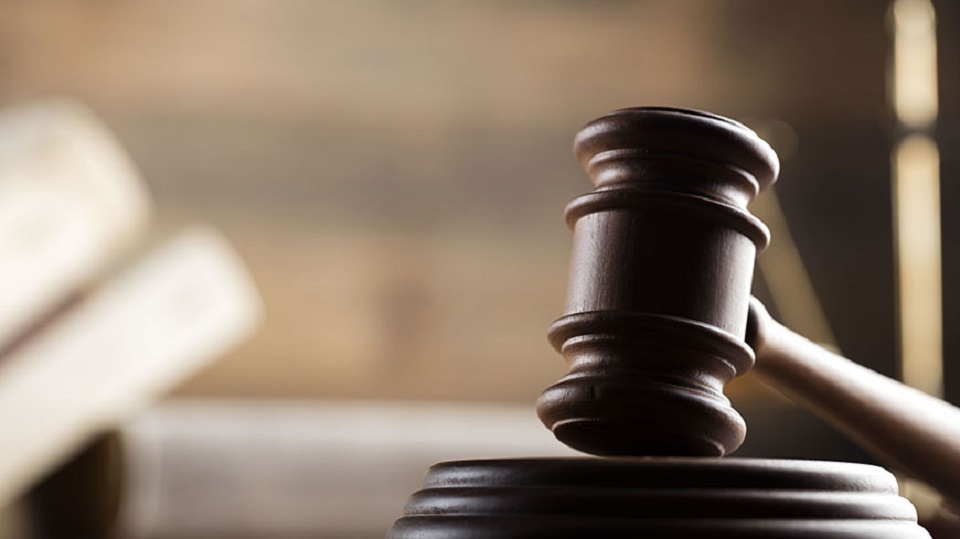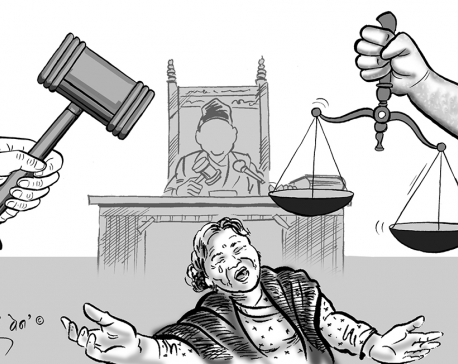
OR

More from Author
Judicial independence is an essential feature of liberal democracy.The United Nations Basic Principles on the Independence of the Judiciary provide that it is the duty of all governmental and other institutions to respect and observe the independence of the judiciary.
Recently former Deputy Inspector General of police, Ranjan Koirala, who was serving sentence on charge of murdering his own wife, was freed following the decision of the Supreme Court on June 29. The court reduced his jail term to eight years and six months, waving 11 years. This particular incident has raised the question of whether the judiciary is acting independently or it is being influenced by other factors. Public faith on judiciary is waning because of such controversial decisions.
Our constitution has envisaged “an independent, impartial and competent judiciary.” Article 20(9) states that, “Every person shall be entitled to a fair hearing from an impartial, independent and competent court or judicial authority.”It implies that no organs of government should influence in its decision making.
Countries deal with the concept of judicial independence through different means of judicial selection.In India, the president is required to consult the governors of concerned states during the judge appointment process for high courts. In South Africa, a fundamental aspect of the judicial service commission is that it maintains representation from provincial actors, ensuring that their voices are not only accounted for, but are also guiding discussions related to their localities. In Canada, independent judicial advisory committees have been introduced at the provincial level, to foster dialogue between local and federal actors. In Nepal, we have Constitutional Council (CC) and Judicial Council (JC) for appointing chief justice and other judges.
After the restoration of democracy in 1990, the constitution promulgated thereafter adopted the concept of the ‘judicial council.’ This was lauded as an exemplary model for the judicial appointment in South Asia. The JC consisted of a majority of judges (three judges out of five members) in 1990. Current constitution has the provision of a five-member judicial council comprising Chief Justice as an ex-officio chairman, minister of law, senior-most judge of the Supreme Court, a senior advocate and a jurist appointed by the president.
Legal and constitutional experts have called this structure flawed. According to them, in such structure politicians can easily influence decision-making and that if it is not revamped, it could pose a serious threat to the independence of judiciary.The principle role of the independence of judiciary is to uphold rule of law, check and balance, constitutionalism and protection of fundamental rights of the people. And it should not fail on this.
These cherished goals can be achieved only if all institutions of the state dispense their functions with dedication and devotion and pay heed to the constitutional mandates.Without judicial independence liberties of people in democracy cannot be protected and the country might descend to anarchism and dictatorship.
In Nepal, efforts for establishing independent judiciary date back to 1951 when Pradhan Nyayalaya Act was enacted. It provided that its decision shall be recognized as irrefutable. It was replaced by Supreme Court Act five years later.
The constitution of 1990, for the first time, recognized the principles of separation of powers and empowered the top court with the power of judicial review over the judicial, quasi-judicial or other state actions. After the formal end of the decade-long armed conflict, the Comprehensive Peace Agreement also reiterated the importance of an independent and competent judiciary.
The current constitution has clear provisions regarding powers of judiciary. There are three tiers of court: supreme, high and district courts. Supreme Court has the final right to interpret the constitution.All the powers to appoint judges in the Supreme Court, high courts and district courts are vested in the JC, while the judicial staffs’ appointment, transfer, and disciplinary actions are under the purview of the judicial service commission.Similarly, the constitution has provided the clear provisions regarding conditions of service and facilities of chief justice and other judges.
According to the current system, judges alone do not constitute majority in the JC, which means political parties can always influence. Besides, constitutional experts have argued time and again that supervision of constitutional bodies by the parliamentary committees was against the principle of checks and balances and independence of judiciary.
The recommendations of appointment made by the Constitutional Council can be challenged in the Supreme Court but since the chief justice is a member of the CC, experts question how the apex court can take action.
On April 30, 2017, ruling Nepali Congress and Maoist party filed an impeachment motion suspending SushilaKarki, Nepal’s first woman chief justice, accusing her of bias and interfering with executive powers. This was seen as the attack on the court by the political parties. Similarly, controversies regarding date of birth and educational qualification of then chief justice GopalParajuli was again a travesty of the fact that many highly qualified judges have been dismissed over less qualified candidates.
Political interference and nepotism in the judge appointment process has adversely affected court verdicts.The judicial council, rather than focusing on representatives with clear political backgrounds, should have independent actors from politics, academia or professional institutions. The judicial council should include actors from provincial structures such as provincial governments, province bar associations or province-level representatives from academia.
Wider public debate on the future structure and process of the judge appointment system is essential to ensure that the transparency, accountability, competence, independence, and fairness of the judges and the judiciary is maintained.
Nepal’s judiciary has become a subject of criticisms in recent years. Measures should be taken to ensure its independence and impartiality.
You May Like This

Int'l legal experts meet govt, civil society representatives to understand challenges to rule of law, including access to TJ and judicial independence
KATHMANDU, March 19: A team of independent international human rights lawyers has conducted a fact-finding mission in Nepal, met a... Read More...

Hijacking democracy
Algorithms will soon be a big part of human society. It is already being used to determine what people see... Read More...










Just In
- Heavy rainfall likely in Bagmati and Sudurpaschim provinces
- Bangladesh protest leaders taken from hospital by police
- Challenges Confronting the New Coalition
- NRB introduces cautiously flexible measures to address ongoing slowdown in various economic sectors
- Forced Covid-19 cremations: is it too late for redemption?
- NRB to provide collateral-free loans to foreign employment seekers
- NEB to publish Grade 12 results next week
- Body handover begins; Relatives remain dissatisfied with insurance, compensation amount








Leave A Comment